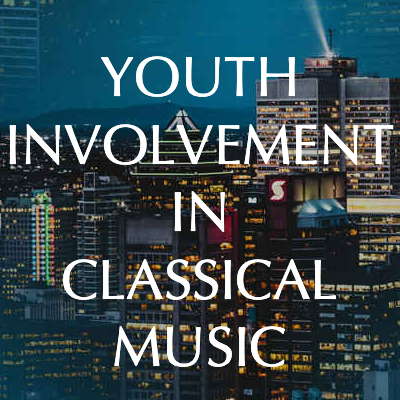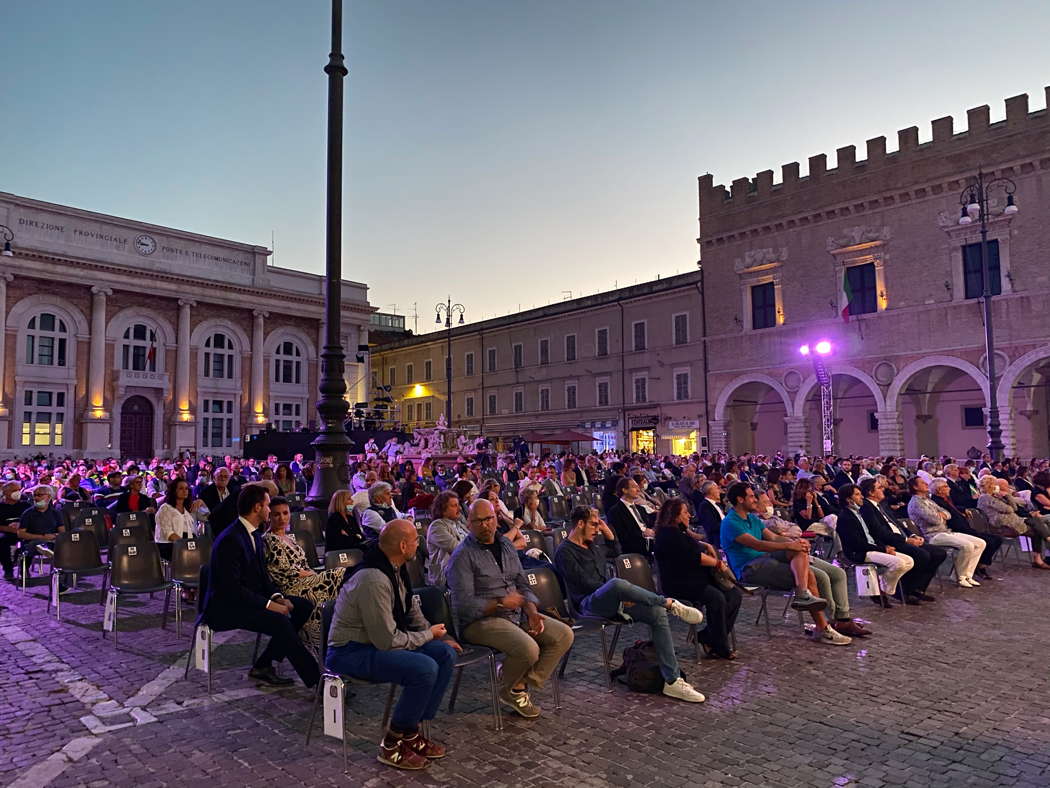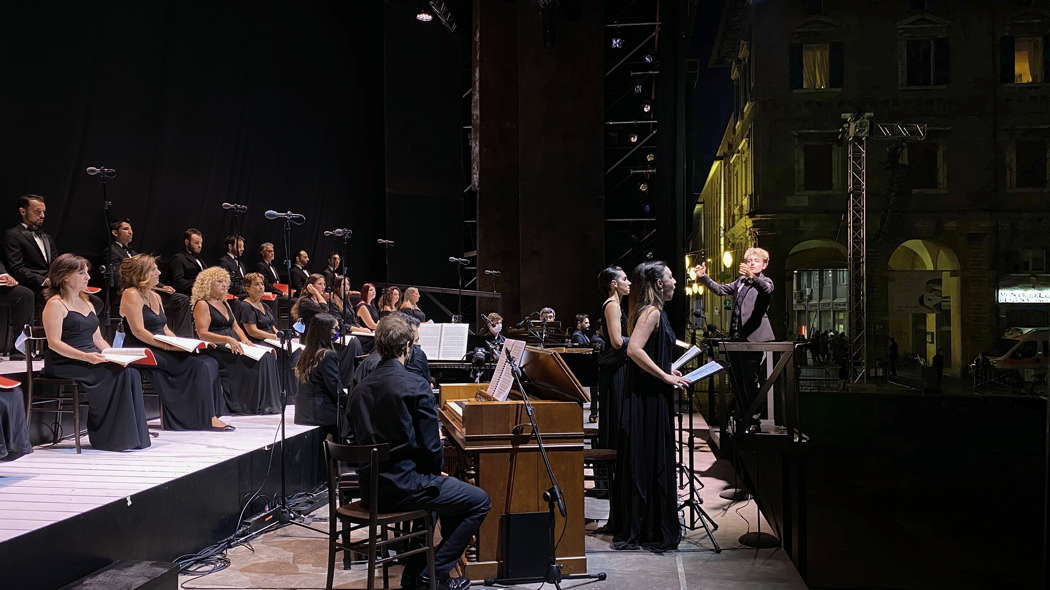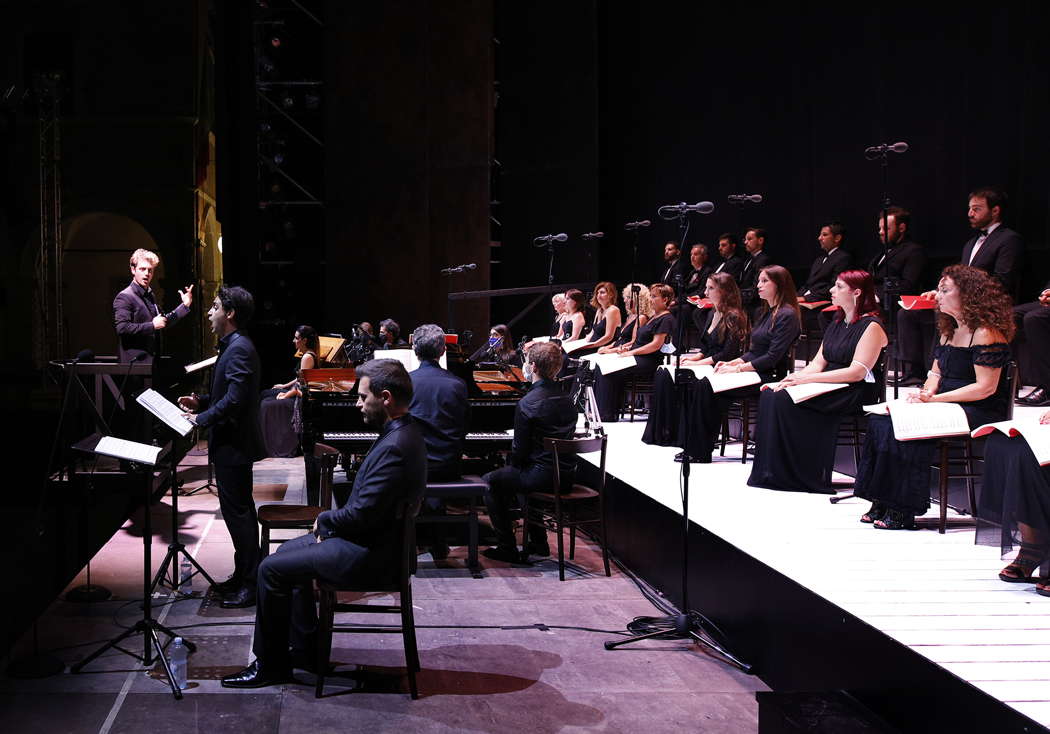 VIDEO PODCAST: John Dante Prevedini leads a discussion about Youth Involvement in Classical Music - this specially extended illustrated feature includes contributions from Christopher Morley, Gerald Fenech, Halida Dinova, Patricia Spencer and Roderic Dunnett.
VIDEO PODCAST: John Dante Prevedini leads a discussion about Youth Involvement in Classical Music - this specially extended illustrated feature includes contributions from Christopher Morley, Gerald Fenech, Halida Dinova, Patricia Spencer and Roderic Dunnett.
Rossini's Last Sin
GIUSEPPE PENNISI attends a very special performance at the Rossini Opera Festival in Pesaro
The official start of the Rossini Opera Festival (ROF) 2020 was 8 August, but on the evening of 6 August 2020 in the Piazza del Popolo in Pesaro, a very important preview took place: a performance of the Petite Messe Solennelle 'in tribute to all the operators in the service of the community' and 'in memory of the COVID-19 victims'. The performance was preceded by four short introductions by the President of the Marche Region, the Mayor of Pesaro, the President of the Rossini Foundation and the Superintendent of the ROF. Pesaro, and in particular the Conservatory, were particularly affected by COVID-19.

The audience in Pesaro's Piazza del Popolo for Petite Messe Solennelle at the Rossini Opera Festival on 6 August 2020
This is one of Rossini's last compositions. Written in 1863, when the composer was seventy-one years old, decades after he had retired from the composition of operas at the age of only thirty-seven and, thanks to a halter contract concluded with him by the Académie Royale de Musique, after five years of legal battles, the French Court de Cassation granted him a very large pension in golden francs. Rossini was born and raised in a Catholic environment (although his father was a revolutionary who fought the temporal power of the Church) but never showed disposition for sacred or spiritual music. His other religious composition (the Stabat Mater) was the result of a very rich commission by the Archbishop of Lisbon. On the other hand, he had neither sponsor nor client for the Petite Messe. Rich, but aged early also because of diseases contracted when he was very young, he was looking for something new. Not only Faith, but also innovations in the musical field. In fact, the Petite Messe not only does not take into account the sacred music of the time, but it skips the Romanticism (then prevailing) and proposes futuristic musical solutions that would develop well beyond the middle of the nineteenth century to reach the beginning of the twentieth century. This explains why, despite the success achieved in France, the first Italian performance took place in 1942, thanks to the insistence of Vittorio Gui (who conducted it), at Santa Croce in Florence.
The Petite Messe was written for twelve singers, including four soloists, two pianos and a harmonium. Rossini also orchestrated it (in 1867) both because he was pressured by several people of his circle but, above all, to show himself his ability as orchestrator since the last time had been on the occasion of Guillaume Tell (1829). Since then, he had devoted himself entirely to chamber music (which he called his 'old age sins'). He referred to the Petite Messe, composed five years before his death, as 'the last of my old age sins'.
After the work was finished, Rossini wrote in the manuscript at the bottom of the Agnus Dei: 'Good God, this humble Mass is over. Is it blessed music, what I just did, or is it just music? I was born for comic opera, you know it! Little science, a little heart, that's all. So be blessed and grant me Paradise.' Thus, the Petite Messe can be considered Rossini's spiritual testament, perhaps already foreshadowing his death.
This premise illustrates how the work was particularly suited both to pay tribute to health workers and to remember the victims of COVID-19. The critical edition was performed. The two pianists, Giulio Zappa and Ludovico Bramanti, with Luca Scandali at the harmonium, have emphasized the modernity of this score whose fourteen pieces are rich in harmonic inventiveness. It fits among the compositions of strong originality, provided with an alternation between church music and secular music. The four singers are excellent: Mariangela Sicilia, Cecilia Molinari, Manuel Amati and Mirco Palazzi. The Choir of the Theatre of Fortune of Fano, led by Mirca Bresciani, also took part. Alessandro Bonato was the conductor.

A scene from Petite Messe Solennelle at the Rossini Opera Festival on 6 August 2020
The Gloria in which Mariangela Sicilia dialogues with the choir and the trio in which Cecilia Molinari, Manuel Amati and Mirco Palazzi sing the Gratias Agimus, were very beautiful. Manuel Amati shows off his high texture in the Dominus Deus. The Credo offered the choir the opportunity to be the protagonist and O Salutaris Hostia gave Mariangela Sicilia chance to show her full vocal agility.

A scene from Petite Messe Solennelle at the Rossini Opera Festival on 6 August 2020
There was very vivid and engrossing applause.
Copyright © 11 August 2020
Giuseppe Pennisi,
Rome, Italy

FURTHER INFORMATION: GIOACCHINO ROSSINI
FURTHER ARTICLES ABOUT THE ROSSINI OPERA FESTIVAL
FURTHER ARTICLES ABOUT COVID-19



